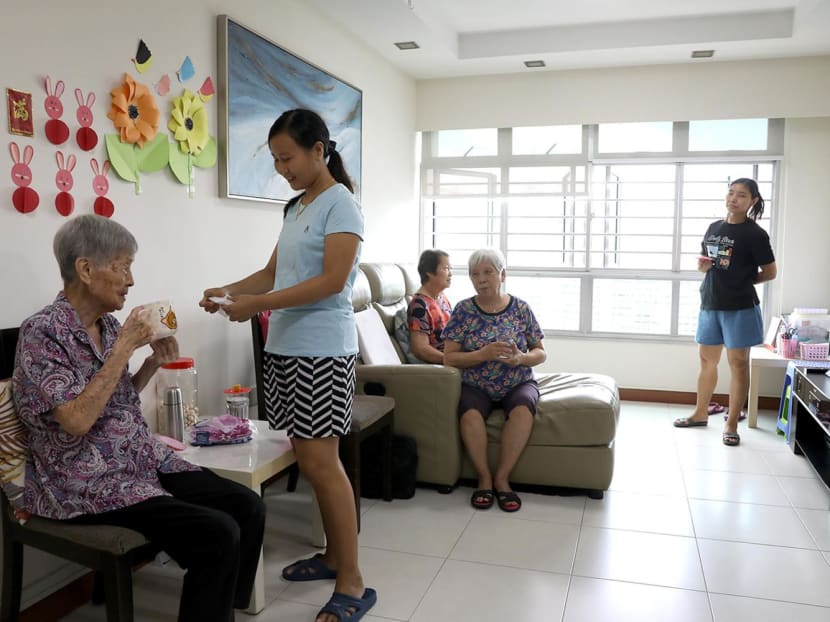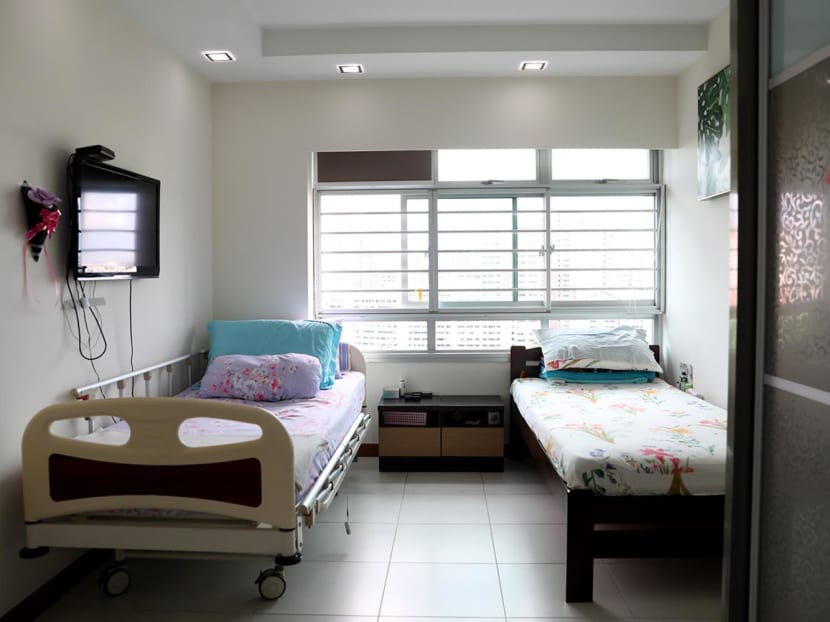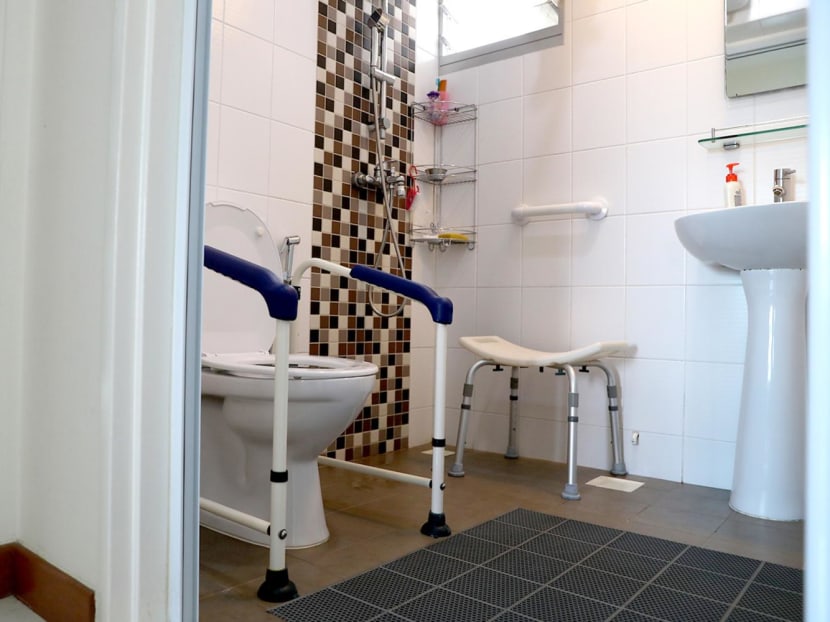Clients of assisted living firm Red Crowns worried about MOM probe, say alternatives in the market 'lack capacity, capability'
SINGAPORE — Clients of a company that is being investigated by the authorities for the way it runs its assisted living services for seniors are worried that they would be left with no other caregiving options for their parents, if the probe results in services being terminated.

Elderly residents and two domestic workers (standing) staying in an HDB flat managed by Red Crowns Senior Living.
- Clients of Red Crowns Senior Living said that they are worried about the Ministry of Manpower’s (MOM) probe into the company’s operating model
- They are afraid that they will have to look elsewhere if Red Crowns' services are terminated
- The clients said there is a “lack of capacity and capability” among existing alternatives in the market
- Red Crowns’ founder Joshua Goh said that he was "surprised" by the announcement about the probe
- He said that the company works closely with its clients and their families to choose and hire domestic workers for their caregiving needs, and is "given the authority" to do so
SINGAPORE — Clients of a company that is being investigated by the authorities for the way it runs its assisted living services for seniors are worried that they would be left with no other caregiving options for their parents, if the probe results in services being terminated.
The clients said that the existing alternatives in the market lack capacity and capability, or are not affordable.
Family members who have engaged Red Crowns Senior Living for assisted living services spoke to TODAY about their difficulties with finding suitable caregiving options and why they turned to Red Crowns in spite of their unconventional model.
Seniors under its care reside in Housing and Development Board (HDB) flats or condominiums, with two migrant domestic workers looking after four elderly people who are not related.
The Ministry of Manpower (MOM) said in a Facebook post on Tuesday (June 13) that it is investigating Red Crowns over a possible breach of foreign manpower laws.
Now the firm's clients are concerned for their elderly parents’ future living arrangements.
“I seriously do not know how to live my life and still take care of my mum if this service goes away,” said 54-year-old Mr Wong Wai Meng, whose 76-year-old mother resides in a four-room flat in Sin Ming rented out by Red Crowns.
CONCERNS OVER COMPANY’S OPERATING MODEL
MOM said on Tuesday that it has "serious concerns" about the company's operating model, where it "retained control" of the key employment terms and deployment of migrant domestic workers (MDWs) — despite their elderly clients being the caregivers’ registered employers.
“This subjected the elderly clients to unnecessary risks”, the statement said, as “they would be held legally responsible if the MDWs sustained a work-related injury, failed to receive timely salary payment(s) or were not provided sufficient rest or accommodation”.
According to the company’s website, Red Crowns offers three types of services for its clients — independent living, assisted living and memory care — with prices starting at S$2,200 for a two-bedder independent living facility in an HDB flat.
Mr Joshua Goh, its founder and chief executive officer (CEO), said that the company is currently serving 130 elderly clients in 33 homes across Singapore.
TODAY spoke to three clients of Red Crowns on Friday, all of whom expressed their concerns should the service be discontinued.
“I am very worried that the investigation has taken a very negative turn for a critical and important service to care for the old folks and dementia patients,” Mr Wong, who works in the tech industry, said.
He added that other caregiving alternatives suffer from either a “lack of capacity or capability” to care for patients with dementia, and that he would not be able to afford other options in the market.
He currently pays more than S$2,000 a month for Red Crowns’ services.
Mr Ahravin Sandrasegaran, 34, whose 68-year-old father currently resides in a flat at Hillview Heights with two other elderly men with dementia, said that other dementia day care centres were not able to meet his needs.
He once tried putting his father at one such centre, but his father would continually ask to return home.
After trying unsuccessfully to get a placement in several private nursing homes due to the long waiting lists, he turned to Red Crowns in June 2022.
“I’ve seen my dad in the past one year, he looks so happy. He has his health and there are activities to engage him,” he said.
Mr Ahravin, who spends S$4,000 a month on caregiving expenses for his father, also expressed sympathy for other families in a similar position.
“Here, you have 130 seniors and their families’ lives at stake,” he said.
For another 69-year-old client, who wanted to be known only as Mr Goh, the social aspect of having other elderly in the same apartment as well as having more dedicated attention paid to his 93-year-old mother were key factors in his decision to choose Red Crowns.
“Such arrangements are very difficult to find in the big homes, where you have one helper to 10, 15 elderly people,” the retiree said.
On TODAY’s visit to one of Red Crowns’ homes along Ang Mo Kio Avenue 1 on Friday afternoon, this reporter saw four elderly clients in a four-room flat. Two of them share one room, with the caregivers occupying another.
The flat's toilets are equipped with elderly friendly facilities like support handles and anti-slip mats, which caretakers said were installed by Red Crowns.

CEO OF RED CROWNS 'SURPRISED' BY ANNOUNCEMENT
In an emailed statement early on Thursday morning, Mr Joshua Goh said that he was "surprised" by MOM's public announcement about the probe on Tuesday.
He said that the company works closely with its elderly clients and their families to choose and hire migrant domestic workers for their caregiving needs, and is "given the authority" to do so.
“In cases where the (elderly) have dementia and are not eligible to be an employer, the children are the sponsors in the caregiver application,” he said.
Mr Goh said that the company uses existing HDB flats and condominiums to “create a home-like environment” for the elderly, and that it acts as a “concierge manager” in assisting the elderly and their families with arrangements from accommodation to household maintenance and daily meals.
Mr Goh added that the company, which is registered with the Singapore Centre for Social Enterprise, has been cooperating with the ministry for the past year-and-a-half to address its concerns.
According to the CEO, the MOM first conducted probes into its business model as early as November 2021 — during which they interviewed several of Red Crowns' caregivers and clients, including Mr Wong.
Mr Goh said that the company has “processes and oversight” in place to ensure the well-being of both its elderly clients and their caregivers.
Mr Ahravin and Mr Wong both told TODAY that closed-circuit television cameras are installed in the common areas of these homes, so that family members can check on them at any time via a live feed.
Despite this, Mr Steven Lam, founder and director of law firm Templars Law LLC, said that MOM’s probe into the company’s operations is justified, citing concerns pertaining to both the domestic workers employed and the elderly.
He said that, in the eyes of the law, “how integrated they are and how much control is exercised over the workers” matters in determining whether they would be considered employees of the company.

In November 2022, Red Crowns was awarded a grant under the DBS Foundation Grant Programme, which was meant to enable businesses to “create impact across social and environmental areas and improve the lives and livelihoods in the region”.
Mr Goh said that Singapore’s ageing population presents an increasing need for elderly care solutions, adding that the company provides an “affordable” service that helps meet the country’s growing demand.
For Mr Wong, previous efforts at finding appropriate caregiving solutions for his mother with dementia had led him to a dead end.
“Scanning across the market, it’s either a lack of capacity or lack of capability… and if I want to go private, it’s super expensive. I can’t afford it,” he said.
He recalls his mother’s antics when she was staying with him and his sister, with the elderly woman having chased away multiple domestic helpers they had employed to care for her over the years.
Now, he reports that she seems to be “so much happier”.
“I have no more alternatives,” Mr Wong said.
“If this thing gets shut down, I have no more solution. I don’t know what to do to care for my mum anymore.”











